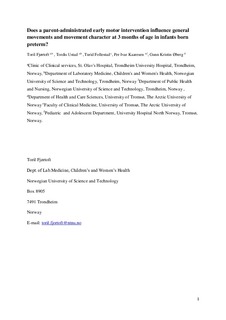Does a parent-administrated early motor intervention influence general movements and movement character at 3 months of age in infants born preterm?
Fjørtoft, Toril Synnøve Larsso; Ustad, Tordis; Follestad, Turid; Kaaresen, Per Ivar; Øberg, Gunn Kristin
Journal article, Peer reviewed
Submitted version
Permanent lenke
http://hdl.handle.net/11250/2495235Utgivelsesdato
2017Metadata
Vis full innførselSamlinger
Sammendrag
Background
Studies of preterm and term-born infants have shown absent fidgety movements and an abnormal movement character to be related to brain lesions and unfavourable neurological outcomes.
Aims
The present study examines what effect a parent-administered early intervention program applied to preterm infants in a randomised control trial (RCT) between 34 and 36 weeks gestational age has on their fidgety movements and overall movement character at three months of age.
Study design
The study was part of the RCT in an early intervention programme including preterm infants born between 2010 and 2014 at three Norwegian university hospitals.
Subjects
130 preterm infants participated in the study, with 59 of them in the control group and 71 in the intervention group.
Outcome measures
Fidgety movements and overall movement character at three months corrected age.
Results
No difference was found between the intervention group and the control group in terms of fidgety movements or movement character. Approximately half of the infants in both groups showed an abnormal movement character.
Conclusion
No evidence was found in this RCT to suggest that an intervention at 34 to 37 weeks gestational age has a significant effect on the fidgety movements or overall movement character of preterm infants. This is in line with the assumption that absent fidgety movements and an abnormal movement character are due to permanent brain injury and are therefore good predictors for later neurological impairments.
